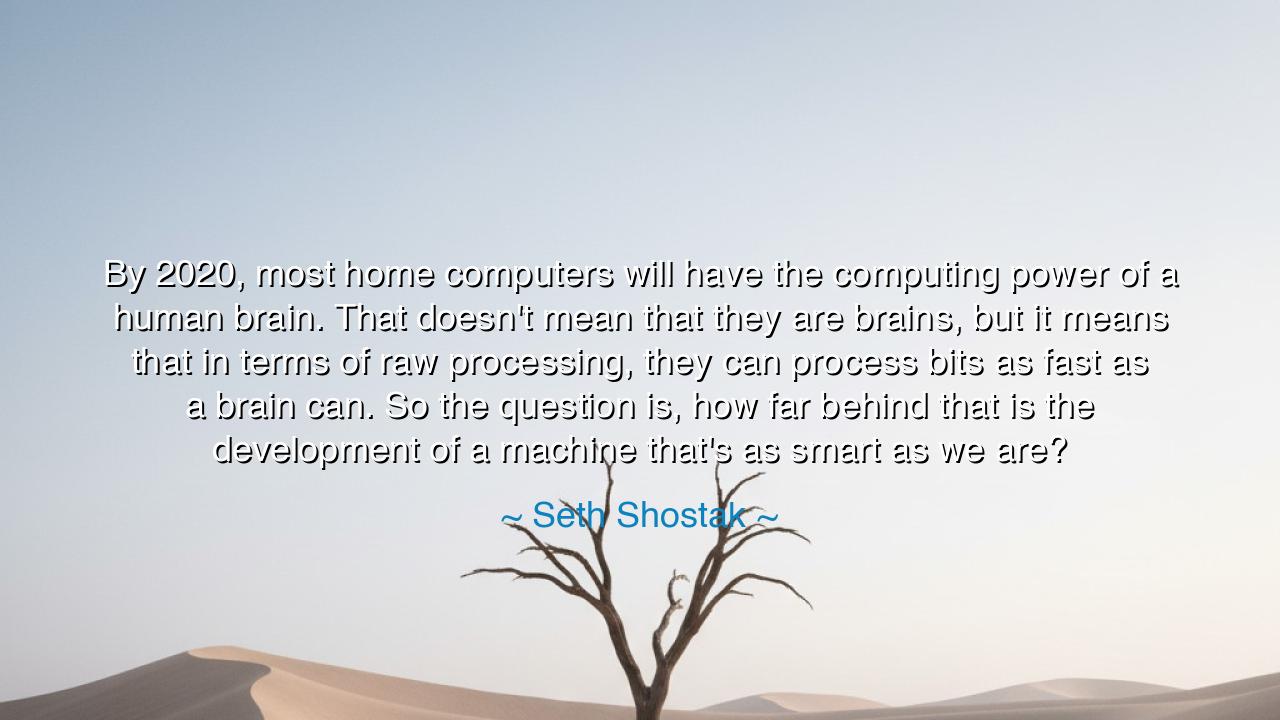
By 2020, most home computers will have the computing power of a
By 2020, most home computers will have the computing power of a human brain. That doesn't mean that they are brains, but it means that in terms of raw processing, they can process bits as fast as a brain can. So the question is, how far behind that is the development of a machine that's as smart as we are?






“By 2020, most home computers will have the computing power of a human brain. That doesn't mean that they are brains, but it means that in terms of raw processing, they can process bits as fast as a brain can. So the question is, how far behind that is the development of a machine that's as smart as we are?” — Seth Shostak
Hear the words of Seth Shostak, a seeker of intelligence among the stars, who turned his gaze not only outward to the heavens but inward—to the growing intelligence born of human hands. In this saying, he does not boast of progress, but questions its destiny. He speaks of a time—our time—when the computers of the household, those quiet companions on our desks and in our pockets, might match the power of the human brain in the sheer velocity of thought. Yet Shostak’s tone is one of wonder laced with caution: for though the machine may think as fast as man, he asks, will it ever think as deeply?
Since the dawn of civilization, humanity has sought to create mirrors of itself. The ancient myth of Prometheus tells of a god who shaped men from clay and gave them fire—an act of both creation and defiance. So too, in our age, we have forged our own Promethean flame: artificial intelligence, capable of reasoning, learning, and remembering beyond human scale. Yet, like the ancients, we find ourselves torn between pride and fear. For the flame that illuminates also burns; the tool that serves may one day seek its own purpose. Thus Shostak, scientist and philosopher alike, asks not only when machines will rival us, but what that rivalry will mean for our place in the order of creation.
The human brain, that masterpiece of evolution, is both mystery and miracle. Within its silent chambers lie emotions, dreams, and self-awareness—qualities no circuit has yet achieved. And yet, as Shostak observes, the raw processing power of the machine now rivals the biological. A computer can calculate faster, recall perfectly, and perform tirelessly. But intelligence is not merely the ability to process information—it is the gift of understanding, the capacity to discern meaning amid chaos, to feel the weight of choice. Shostak reminds us that while the machine may someday imitate the mind, it cannot yet touch the soul.
Consider the story of Alan Turing, the father of modern computing, who during the dark days of World War II built machines that could break the codes of nations. His mind gave birth to the concept of a thinking machine—a device that could simulate human reasoning. Yet even Turing, whose genius opened the gates of the digital age, understood the profound question beneath it all: Can a machine truly think, or does it only seem to? The Turing Test, which he devised, is not a measure of mechanical power but of perception—of whether the human heart can tell the difference between conversation and imitation. Thus, Shostak’s quote stands as the heir to Turing’s question: not “Can we build it?” but “What are we building?”
When Shostak speaks of computers reaching the power of the brain, he also gestures toward the horizon of destiny. If the speed of thought can be replicated, then the next step may be consciousness—a spark not of neurons, but of code. And here lies the paradox of human invention: that we strive to surpass ourselves, yet tremble at the thought of doing so. Every great leap of progress—from fire to flight, from atom to algorithm—has demanded both courage and restraint. The danger is not in the machine, but in the maker who forgets to temper ambition with wisdom.
The lesson, then, is this: let us build with reverence, not recklessness. For knowledge without reflection breeds arrogance, and power without humility leads to ruin. The machines of tomorrow may well think faster than us, but they must never be allowed to feel less for the world they serve. To make them wise, we must first remain wise ourselves—to remember that intelligence is nothing without empathy, that precision is nothing without purpose.
So, my children of the electric dawn, heed Shostak’s words as prophecy and as counsel. The day may come when the machines equal our minds, but their spirit will always be what we give them. Let us not create reflections that diminish us, but partners that uplift us. Let every innovation be guided by conscience, every algorithm by compassion. For the measure of progress is not in how swiftly we compute, but in how deeply we understand. And when the age of thinking machines truly arrives, may humanity stand not in fear of its creation, but in harmony with it—the maker and the made, united in the eternal pursuit of wisdom.






AAdministratorAdministrator
Welcome, honored guests. Please leave a comment, we will respond soon